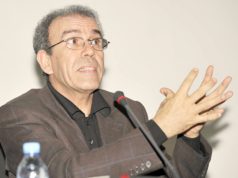RABAT, Morocco- When the Arab spring sparked, no one was expecting that such a powerful and rich country as Libya will be the next on the list to the gallows. After almost three years of ups and downs, Libya, the North African country that was once considered the paradise land for thousands of migrants looking for a better life, turned into, unfortunately, a land where the mere Political stability became the first and foremost usher any Libyan citizen dreams of with the unveiling of 2015 .
Mr.Youssef Gherradi interviewed on behalf of The Moroccan Times an active society member in Libya to put a spotlight on what is going on right now in the said country. Our interviewee, whom we picked for her the name Fatema as for security reasons she is giving TMT this interview on the condition of anonymity, has shown a great interest in what is going now in the Arab world and told The Moroccan times that “education is what the Arab world truly needs to move forward.”
The Moroccan Times: Could you please introduce yourself?
Fatema: “Allow me first to put a spotlight on my background and where I came from. My name is Fatema. I am a Libyan ruble girl from Benghazi. I was born in a conservative family , but that fact did not stop me from speaking up and fighting for my rights, let alone being an active civil society member advocating for women and human rights.”
The Moroccan Times: Recently, from what we see in the news, we have the impression that Libya has reached its lowest nadir. Could you please describe to our readers, as an on the ground eyewitness, the current situation?
Fatema: “It is very difficult to describe the situation in detail as it could take me ages to shed some light on what is happening. To keep it short, I’ll just say that everyone is fighting for his own interests. I can’t see them fighting for Libya. They are destroying what Gaddafi left, and I mean by left what wasn’t destroyed after he gave up the reins of power.
“The country is going through a civil war; every tribe wants to take revenge from the other one. Everyone wants to control the oil. We have two governments: one in the east and the other one in the west. They work at the same time. There is a war against the Islamic Militias in Benghazi and Derna [a port city in eastern Libya] but we didn’t see any results so far. The army is basically out of weapons, which make them so weak, ergo the situation has atrophied.
“It has been three months now since this war kicked in Benghazi and all we can see is the bloodshed from two sides, let alone the many victims from civilians. There are many who lost their houses. To illustrate, 90% of Benghazi’s citizens are internally displaced people.
“In a nutshell, there is only few people who were/are fighting for Libya and, unfortunately, even those very few ones were targeted or will be the next targets of militias.
The Moroccan Times: You mentioned previously that you are an active civil society member, advocating for women and human rights. How would you assess the current situation of women in Libya?
Fatema: “ The situation of Libyan women, including that of human rights at large are in tatters. I can’t separate the two from each other [Women’s situation in Libya and Human Rights] in a country that still has neither a law nor a constitution. Under the rule of Islamic militias, women almost have no rights and the situation is becoming very difficult, especially in the last two years after that the militias took control over all the country. It becomes very easy to kidnap and kill women, or even threaten them just because they are members of a civil society that speaks up for their rights.”
“Just recently, We witnessed various assassinations of powerful Libyan women including the Lawyer activist Salwa Bugaighis, the brave female voice Fatiha Al-Berjawi and many others. Let there be peace upon their souls.
“Also, I want to add that we can’t deny the crystal-clear fact that the Libyan culture is very strict when it comes to women rights, whether a woman is divorced, married or single. They [ The family and people in general] always try to put obstacles in women’s way in order not to allow them achieve their goals and see their dreams come true.
“Young women find difficulties in being independent, they need to take permission from the legal tutor (Mahram). of the family in everything, from sex to hygiene. They can’t even travel to finish their studies or participate in any fellowship or conference unless they are accompanied by their legal tutor Very few families allow their daughters to travel alone, and for the majority it is still a taboo. Hence, many girls decided to get married to, at least to live with a bit more ease with their husbands.
The Moroccan Times: How do you see Libya in 2015?
Fatema: “It is really difficult to have a vision for Libya in 2015 as the country is going through very hard times. However, I wish to see it under the control of the army. We should not lose hope and believe in the good people that are still out there.”
The Moroccan Times: What’s your dream for the upcoming year?
Fatema: “To see Libya as a country that has an enshrined law and a written constitution where all citizens are equal and have their rights. I would love to see the Libyan people build the country as one man. My dream is to see Libya stand up again.”
The Moroccan Times: What could you say to your fellow Arabs?
Fatema: “Love your countries, be passionate about them and never wait for something from the government. Work hard to achieve your goals and dreams. The Arab world needs an educated generation.





